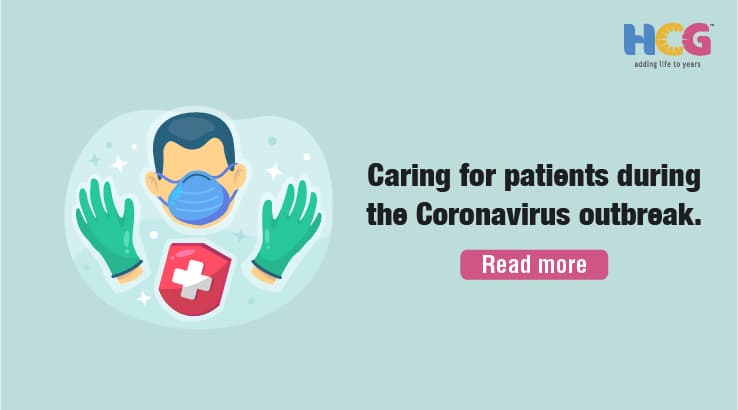
25 Jan, 2022

25 Jan, 2022
Healthcare providers are rapidly adapting to the demand of the hour, in response to the coronavirus disease 2019 (COVID-19) pandemic. The ecosystem of healthcare is taking strategic as well as cautious steps to mitigate the infection risk, which otherwise might have profound effects on other vital aspects of patient care. Focus on thorough planning and execution is vital to deal with the challenges of treating patients while ensuring their rights, safety, and wellbeing.
A surge in telemedicine and video-consultation is witnessed recently, post the lockdown imposed by the government. Since cancer patients are always at a higher risk due to their compromised immune system, cancer hospital like HCG has readily moved to contactless consultations. Through the implementation of telemedical approaches to re-sequencing treatments, cancer centres across the nation should adapt to face the clinical challenges posed by the novel coronavirus 2019 disease (COVID-19). These modifications in standard operating procedures mitigate the risk of virus spread among clinicians and patients alike.
According to the recent report of the WHO-China Joint Mission on COVID-19, the case fatality rate for patients with cancer as a comorbid condition and laboratory-confirmed infection was 7.6%, which was significantly lesser than cardiovascular disease 13.2%, diabetes 9.2%, hypertension 8.4%, and chronic respiratory disease 8.0%. Infection control policies and patient education practices in cancer hospitals are robust and well adapted to mitigate the risk posed by the high attack rate of COVID 19.
Personalised and precision-based cancer care, to a large extent, depends on using drugs that strengthen the body’s own immune system to fight cancer. The same strategy is currently under clinical trials to develop treatments for COVID 19. Targeted agents used in cancer treatment like Signal transduction inhibitors, Angiogenesis inhibitors, Apoptosis-inducing drugs, Hormonal therapies, and Immunotherapy agents do not cause immunosuppression and can be safely used during the COVID-19 pandemic even in an unlikely event of a COVID-19 positive cancer patient. Chemotherapy drugs are known to normalise the NLR ratio, which is a sensitive predictive marker of response. In COVID-19 infection, the NLR ratio is reported to increase signifying an inflammatory phenotype; this further suggests that cancer treatment is imperative for complete treatment of an unlikely COVID-19 positive cancer patient; however, this needs to be decided on a case to case basis.
In a retrospective study of 522 patients conducted by Bo Diao et.al., at the Department of Medical Laboratory Center, General Hospital of Central Theater Command, Wuhan, China, total T cells, CD4+, CD8+ T cell subsets, and serum cytokine concentration were analysed. In addition, expression of T cell exhaustion markers PD-1 and Tim-3 was analysed in 14 patients. The number of total T cells, CD4+ and CD8+ T cells were significantly reduced in COVID-19 patients. In addition, significantly higher levels of the T cell exhaustion marker PD-1 as compared to healthy controls were found. (7)
Immunotherapy regimens are designed to decrease the immune exhaustion and thereby help the body’s defences to fight cancer. Such modern treatment strategies possibly decrease the susceptibility towards infections as well.
PD-1 blocking antibody is already under clinical trials for treating COVID-19 (ClinicalTrials.gov Identifier: NCT04268537, NCT04333914). (8, 9) In the IMMUNONCOVID study (NCT04333914) the goal is to compare the efficacy of a chloroquine analogue (GNS561), an anti-PD-1 (nivolumab), and an anti-interleukine-6 receptor (tocilizumab) versus standard of care in patients with advanced or metastatic cancer who have Sars-CoV-2 infection. (9) This highlights the potential overlapping strategy for treating cancer and COVID-19.
When the bodys infection-fighting white blood cells are low in numbers or do not function well, the body is unable to fight infections effectively. Immunotherapy regimens are designed to decrease immune exhaustion, and thereby help the bodys defences to fight cancer. Such modern treatment strategies possibly reduce the susceptibility towards infections as well.
Chemotherapy and radiotherapy should be continued for cancer patients as scheduled. The hospital operations have adapted stringent infection control practices over and above the usual cancer care protocols. Bone marrow transplants are not at risk as they are conducted in a highly sterile and controlled environment. A virtual multidisciplinary tumour board takes all major diagnostic and therapeutic decisions including the surgeries for complicated cases. The laboratory support for cancer care, including histopathology and molecular pathology, is equally important and needs to optimise resources and adapt to the current scenario.
Oncologists can modify their schedules and operations for hospital teams to adapt to the new scenario. Offering teleconsultation services for stable patients, especially for those on oral therapies, and re-evaluating regimen schedules to optimise the number of clinic visits during the pandemic (three or two-weekly as opposed to weekly and oral or subcutaneous alternatives wherever feasible) is being highly encouraged. A day before the visit, telephone triage is recommended to identify flu-like symptoms in cancer patients so that appropriate measures can be taken.
The sudden lockdown due to the pandemic has created additional psychological stress. Psycho-oncology services should also be well adapted to help cancer patients, providing patients with the best coping strategies to fight back in these challenging times.
Even in this unusual situation, the healthcare fraternity has geared up to ensure that the treatment is not denied to cancer patients and reassure the patients that they are in safe hands with specialised and focussed cancer care centres well adapted to take care of their disease as well as keep them and their caregivers safe from COVID-19.
(Contributed by Dr Suhail Sayeed Mufti, Director HCG Centre for Translational Medicine and Therapeutics and Dr Radheshyam Naik, Haemato Oncology, HCG Cancer Hospital)